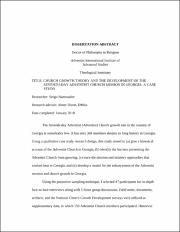Church growth theory and the development of the Seventh-day Adventist church mission in Georgia : a case study
Abstract
The Seventh-day Adventist (Adventist) Church growth rate in the country of Georgia is remarkably low. It has only 368 members despite its long history in Georgia. Using a qualitative case study research design, this study aimed to (a) give a historical account of the Adventist Church in Georgia, (b) identify the barriers preventing the Adventist Church from growing, (c) trace the mission and ministry approaches that worked best in Georgia, and (d) develop a model for the enhancement of the Adventist mission and church growth in Georgia.
Using the purposive sampling technique, I selected 47 participants for in-depth face-to-face interviews along with 5 focus group discussions. Field notes, documents, artifacts, and the National Church Growth Development surveys were utilized as supplementary data, in which 150 Adventist Church members participated. Historical
documentary analysis revealed that persecution and loneliness were constantly pressuring Adventists in Georgia. This study discovered unknown but important individuals who significantly contributed to the Adventist mission in Georgia. Through thematic data analysis, a total of 20 themes and 54 categories emerged in an attempt to answer the 3 research questions. The external and internal barriers such as (a) social pressure, (b) Georgianness, (c) modernization and progress, (d) occupational pressure, (e) organizational disconnection, (f) frustration, (g) use of effective methods of evangelism, (h) lack of discipleship, and (i) uninvolvement of the laity all present significant hindrances to the Adventist mission and church growth in Georgia.
Despite these barriers, this study has revealed that Adventists in Georgia are able to win souls when they are successfully led through the necessary stages. These stages are depicted in 6 emerging themes: (a) focusing on responsive groups, (b) employing attractive features, (c) expanding the network, (d) earning the right to share the Gospel, (e) using effective evangelistic methods, and (f) recognizing the work done by the Holy Spirit. As such, instead of a single-step strategy, a multiple-step mission strategy is proposed. Furthermore, the Natural Church Growth Development survey analysis and the participants’ reports helped identify the areas for improvement. These are (a) enhancing church health, (b) developing the appropriate mission strategy, (c) acknowledging the role of a foreign missionary, (d) adapting meaningful communication and cultural appropriateness, and (e) addressing Georgian aesthetics and the culture of prestige.
Collections
Related items
Showing items related by title, author, creator and subject.
-
Possible correspondences between church growth principles and nine Chinese churches in Metro Manila
Hintay, Jadaza M. (Adventist International Institute of Advanced Studies, 2008)Several attempts by the Central Luzon Conference of Seventh-day Adventists to increase the number of members at the Manila Chinese SDA Church have not met with success over the years. In contrast, nine Chinese churches ... -
A training program for the elite church members of the local Seventh-day Adventist church in evangelizing the elite people of Metro Manila
Andoy, Israel (Adventist International Institute of Advanced Studies, 2003-01)Pasay Seventh-day Adventist Church (PAC) is a church whose purpose is to accomplish the Great Commission of Jesus, specifically to the people of Metro Manila, including the elite. Most of the PAC members are elite people. ... -
The Influence of Roman Catholic Church and World Council of Churches' social action toward the pursuit of Ecumenism in the 21st century
Luaya, Cristopher Verian (Adventist International Institute of Advanced Studies, 2013-06)Central to the venture of this thesis is to see the influence of social action to the search of unity in the 21st century. Chapter 1 presents the introduction of the paper. The focus of Chapter 2 is to describe the social ...


